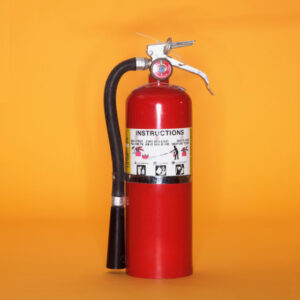
We’ve answered some of the most common fire extinguisher questions that people frequently ask to help you understand how to maintain and operate them.
Knowing the ins and outs of fire safety equipment isn’t necessarily on top of everyone’s to-do list, but it is important. Fire safety is something everyone should take seriously, and part of this is understanding fire extinguishers and how they operate. This knowledge can make all the difference if you ever do happen to find yourself in a situation where you need to operate an extinguisher to put out a fire.
Can you use any extinguisher on any fire?
No. There are several different types of fire extinguishers, and each one is specially designed to handle certain kinds of fires. Knowing what type of extinguisher you have and what kinds of fire it is rated for is important. Aside from knowing the rating (Class A, B, C, D, or K), you should know what type of agent your extinguisher uses. For example, you wouldn’t want to use a water extinguisher on sensitive electrical equipment—such as a server or even a home computer. The water might put out the fire in this case, but the water damage could be significant.
Is it dangerous to drop a fire extinguisher?
Yes. Fire extinguishers are pressurized, so dropping them can be a serious problem. Damage from a drop could result in unseen damage that compromises the integrity of the extinguisher. In addition, the pickup tube could be broken in a fall, which would prevent the extinguisher from operating. If you drop a fire extinguisher, don’t hang it back up. Set the extinguisher aside in an isolated area and call the professionals in to remove the one that was dropped and replace it with a new one.
What is the lifespan of a fire extinguisher?
Fire extinguishers don’t have a true expiration date, but they don’t last forever. If you have a rechargeable extinguisher, the NFPA recommends recharging it every 6 years. Over time, it may need to be replaced—especially if it has any damage or significant wear and tear. The person that services your equipment can help you determine when it is time to replace these extinguishers. For disposable (single-use) fire extinguishers, the NFPA recommends replacing them every 12 years.
How often should a fire extinguisher be inspected?
According to the NFPA, fire extinguishers should be inspected at the time of installation and every month after that. You can do these inspections yourself if you prefer, but it is recommended that a professional come out and inspect it at least once a year. Some problems can be easy to miss, and that’s where having an experienced professional can help.
Can a fire extinguisher be refilled once it is discharged?
Yes. Well, usually. While many fire extinguishers are rechargeable and capable of being refilled, there are disposable fire extinguishers. Disposable extinguishers are single-use, and these cannot be refilled.
Fire Protection Services from Fireline
Whether you need smoke detectors, fire extinguishers, or an automatic sprinkler system installed at your commercial property, Fireline has you covered. We have been protecting
people and property from fire damage since 1947—and our experience shows in our excellent work! We are known for our superb customer service, our expertise, and our reliability. For more information on how we can help your residential or commercial property, visit us online or give us a call at (800) 553-3405. We are in Baltimore, MD, with a second office in Leesburg, VA. For more fire safety tips, be sure to follow us on Facebook, Twitter, and LinkedIn.
